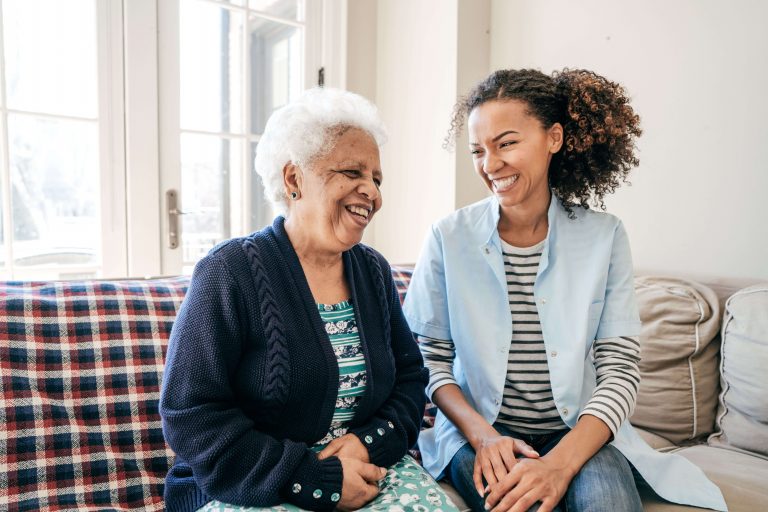Memory Care: Watching for Signs of Memory Loss
As we grow older, minor signs of memory loss is often a part of our normal aging process. “Where are my glasses?” your uncle exclaims at the dinner table, as the whole family looks at the glasses sitting atop his head. “What’s the name of that actor, you know the one in that movie about the…” you think to yourself, visualizing the big Hollywood star’s face in your head, but their name slips your mind for a minute or two. Or the classic — “What did I come here for?” as you stand in the grocery store aisle with a basket full of items but you can’t remember THE one item you drove to the store for in the first place!
Memory Loss & Aging: What to Look for & Steps You Can Take to Combat It!
 As we age, simple forgetfulness problems such as those mentioned above can be a completely normal part of getting older. Medical science has proven that age-related physiological changes can cause mild ‘misfires’ in brain functioning that probably didn’t occur when you were in your twenties, and for the most part, these changes, while certainly annoying, are nothing to worry about. Typically, if you give yourself a little time, the name/place/whatever piece of information you were scanning your brain to find will come back to you. Additionally, there are proactive steps you can take right now to improve memory function, such as any of the following:
As we age, simple forgetfulness problems such as those mentioned above can be a completely normal part of getting older. Medical science has proven that age-related physiological changes can cause mild ‘misfires’ in brain functioning that probably didn’t occur when you were in your twenties, and for the most part, these changes, while certainly annoying, are nothing to worry about. Typically, if you give yourself a little time, the name/place/whatever piece of information you were scanning your brain to find will come back to you. Additionally, there are proactive steps you can take right now to improve memory function, such as any of the following:
• Challenge Your Brain
Crossword puzzles; the popular online game, Wordle; or Sudoku, etc.; essentially anything that puts your brain to work can stimulate and possibly improve brain functioning, of which memory is a part.
• Eat Nutritious Foods
It’s common knowledge that healthy food is good for the body, and that’s not just the physical… the brain needs healthy foods to support its functioning also, so eat well!

• Exercise
Get your walking shoes on and get out there! Physical exercise increases oxygen to your brain and can decrease the chances of developing health problems that lead to more severe memory loss.
• And Get Your Rest!
There are countless articles and research studies touting the important effects that a good night’s rest has on our bodies. Good sleep is critical for optimum memory function, and even shorting yourself an hour can have a negative impact. Make sleep a priority and you may see your mild memory loss improve.
However, even if you’re doing everything right, you’re rested, eating healthy, and solving the NY Times Sunday crossword every week with no problem, dementia can still occur. Therefore, it’s important to know the difference between simple age-related forgetfulness and memory loss that could indicate a more serious decline in cognitive ability.
Memory Loss & Dementia: What’s Normal, What’s Not?
It’s important to know what’s normal and what’s not in regard to memory loss and dementia. Dementia is a word that serves as a catch-all term for a multitude of issues that could include the loss of memory, language problems, difficulties with problem-solving, reasoning, learning, and mood changes, as well as other issues that are related to the mind and its ability to function normally, all of which interfere with someone’s daily life. Alzheimer’s disease is a common form of dementia and it’s estimated that 60% to 80% of dementia cases are Alzheimer’s.
What Causes Dementia?
Dementia is caused by brain cell damage. Scientific researchers have found that, on average, a normal human brain has 86 billion neurons. Neurons are our messengers that send, and receive, vital electrical and chemical signals throughout the human body and when damage occurs their ability to perform critical duties is diminished.
 What’s Normal, What’s Not?
What’s Normal, What’s Not?
Dementia, in any form, is not normal. But how can you tell what’s normal, and what’s not? Some of the signs may be obvious, but others may be rather subtle. As early diagnosis is always the best approach for any illness, it’s important to watch for and spot the signs as soon as possible. There are many signs to look for, signs that are vastly different from the normal age-related forgetfulness discussed above, so if you’re seeing signs or think you are, in someone you love, consult with a doctor. Some of the more common signs to look for, signs of abnormal brain function are as follows:
• Confusion
If you find that a family member is asking a question, or questions, over and over; if they are confusing the faces/names of family members; or have begun placing common kitchen items or bathroom items, etc. in the wrong areas, such as putting the ice cream in the pantry instead of the freezer — these could be early signs of dementia.
• Disorientation / Getting Lost
Becoming disoriented to the point where someone can’t find their way home from an evening walk that they’ve taken many times before, or when they get lost driving to the grocery store that they’ve visited for years, these are signs that dementia could be causing cognitive dysfunction and memory loss.
• Trouble with Instructions or Following Procedures
If you notice a family member struggling with basic instructions, having trouble following procedures such as a simple cooking recipe, taking medications at the wrong time or wrong dose, paying bills improperly, etc., these could be the effects of dementia.
• Hygiene / Self Care
If you notice common hygiene practices and general self care becoming an issue, such as failure to shower or bathe, or forgetting to eat daily meals — these are worrisome problems that could be the results of cognitive impairment and dementia.
Getting Help
If you see any of the aforementioned signs, talk to a doctor right away. And remember, the list above is just the tip of the iceberg, there are many signs that could indicate dementia, so always err on the side of caution and talk to a doctor to get a proper medical evaluation. There is no cure for dementia, but early diagnosis can provide some crucial advance time to begin a treatment plan that could slow dementia’s development.
What Can You Do When Dementia or Alzheimer’s Takes Hold?
 The diagnosis of dementia or Alzheimer’s is a devastating one, it’s a shock to the whole family, especially in cases when dementia’s onset happens quickly. Obviously, your first action will be to thoroughly discuss all your options with your family’s physician, including Alzheimer’s medications such as Donepezil, Galantamine, Rivastigmine, and others that are often prescribed to treat mild to moderate Alzheimer’s cases. But as there is no cure for Alzheimer’s or other dementia-related conditions, many who have walked this road before you have found memory care to be the best option for their family member. This is because memory care goes far beyond assisted living in terms of specialized care.
The diagnosis of dementia or Alzheimer’s is a devastating one, it’s a shock to the whole family, especially in cases when dementia’s onset happens quickly. Obviously, your first action will be to thoroughly discuss all your options with your family’s physician, including Alzheimer’s medications such as Donepezil, Galantamine, Rivastigmine, and others that are often prescribed to treat mild to moderate Alzheimer’s cases. But as there is no cure for Alzheimer’s or other dementia-related conditions, many who have walked this road before you have found memory care to be the best option for their family member. This is because memory care goes far beyond assisted living in terms of specialized care.
Excellent memory care is about personalization, and that’s the foundation of our Valeo Memory Care at The Pavilion at Great Hills. Every resident of our memory care community has a full life they’ve led and a full life ahead. Every resident is unique, and their needs are also. Our team members get to know the residents intimately by taking the time before and during move-in to learn all they can about a resident’s past, their stories, and talents, and team members perform a comprehensive wellness review of each resident’s abilities and engage with them in a thorough discussion about their passions and needs.
Our signature engagement programs are designed to increase cognitive functioning, enhance socialization, and recapture memories. From our arts and music program, Create & Compose, that helps stimulate creativity; to our travel program, Travel Time, that expands the mind and helps enhance memories that have been lost; we consider every aspect of residents’ lives and seek the latest advances in specialized care to combat dementia on every level as we can. And with advances in medical treatment, the future continues to look even brighter! Learn more about our Valeo signature programs here.
We believe every person deserves to live a life that’s full, rich, and filled with joy, regardless of their physical or mental challenges, so we work hard to develop individualized plans for well-being and health backed by scientific research — with the goal of helping residents live their absolute best lives! Contact the team at The Pavilion at Great Hills with your questions, or to learn more about our programs and care.


 What’s Normal, What’s Not?
What’s Normal, What’s Not?




